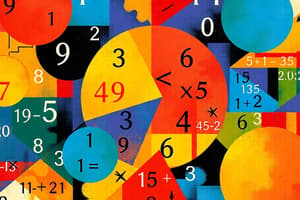Podcast
Questions and Answers
What methods can be used to determine the roots and solutions of linear equations and systems?
What methods can be used to determine the roots and solutions of linear equations and systems?
- Integration, differentiation, limit analysis, and approximation
- Substitution, elimination, graphing, and inspection (correct)
- Factoring, completing the square, and using the quadratic formula
- Multiplication, division, addition, and subtraction
In quadratic equations, what does the term 'ax^2+bx+c=0' represent?
In quadratic equations, what does the term 'ax^2+bx+c=0' represent?
- Quadratic equation form (correct)
- Exponential equation form
- Cubic equation form
- Linear equation form
What is the primary focus of algebra?
What is the primary focus of algebra?
- Working with trigonometric functions
- Calculating areas and volumes
- Understanding historical mathematicians
- Solving problems with variables and expressions (correct)
What role do factors play in understanding algebraic properties and equations?
What role do factors play in understanding algebraic properties and equations?
Which type of functions are students likely to encounter in algebra?
Which type of functions are students likely to encounter in algebra?
How do methods like factoring, completing the square, and using the quadratic formula contribute to solving quadratic equations?
How do methods like factoring, completing the square, and using the quadratic formula contribute to solving quadratic equations?
What is a key aspect of algebraic expressions?
What is a key aspect of algebraic expressions?
What type of solutions can be found by applying factorization in algebraic expressions?
What type of solutions can be found by applying factorization in algebraic expressions?
How do students typically solve linear equations?
How do students typically solve linear equations?
How do understanding quadratic behavior and visualizing parabolas help in algebra?
How do understanding quadratic behavior and visualizing parabolas help in algebra?
What does the expression $x ime t + y ime t$ represent?
What does the expression $x ime t + y ime t$ represent?
Apart from linear equations, what other type of equations might students encounter in algebra?
Apart from linear equations, what other type of equations might students encounter in algebra?
Flashcards are hidden until you start studying
Study Notes
Math in Class 10: Exploring Algebraic Concepts
Algebra is a cornerstone of mathematics, providing tools and techniques to solve problems with variables and expressions. In this exploration of math concepts for students in Class 10, we'll delve into several key aspects of algebra and their applications.
Elementary Concepts
At its foundations, algebra focuses on equations — statements related by equality — and solving them for unknown values. This includes learning how to identify linear equations, quadratic equations, exponential functions, logarithmic functions, and more. Students will also work through problems involving operations like addition, subtraction, multiplication, division, and simplifying expressions with parentheses.
Working with Variables & Expressions
A pivotal part of algebra involves working with variables such as x, y, z, etc., where you represent quantities whose exact value isn’t known yet. By using operations on these variables, students learn how to create mathematical expressions that can model real phenomena. For example, if I have two cars traveling at different speeds, I could express the distance each one covers using x meters per second and y meters per second, respectively, resulting in the expression (x\cdot t + y \cdot t) to find the total distance traveled after time (t).
Solving Linear Equations
Students will focus primarily on solving first and second degree linear equations. These involve single variables with coefficients and constants in linear terms, such as (ax + b = c), where (a,\ b,\ c\in\mathbb{R}). Methods like substitution, elimination, graphing, and inspection help students determine the roots and solutions of linear equations and systems.
Quadratic Equations
Quadratic equations introduce another level of complexity. They follow the form (ax^2+bx+c=0), where all three parameters are real numbers. A variety of methods contribute to finding the solutions, including factoring, completing the square, and using the quadratic formula. Understanding quadratic behavior helps students visualize parabolas and better appreciate polynomial graphs.
Factors and Their Properties
Factors and factorization play an essential role in understanding algebraic properties and equations. Identifying factors and applying divisibility rules allows students to break down complex equations into simpler ones. At times, it might even lead to finding integer roots in linear and quadratic expressions.
These fundamental principles in algebra serve as stepping stones towards advanced courses and careers in various STEM fields. As you continue your journey in Class 10 math, practice regularly and seek out opportunities to strengthen your problem-solving skills!
Studying That Suits You
Use AI to generate personalized quizzes and flashcards to suit your learning preferences.




